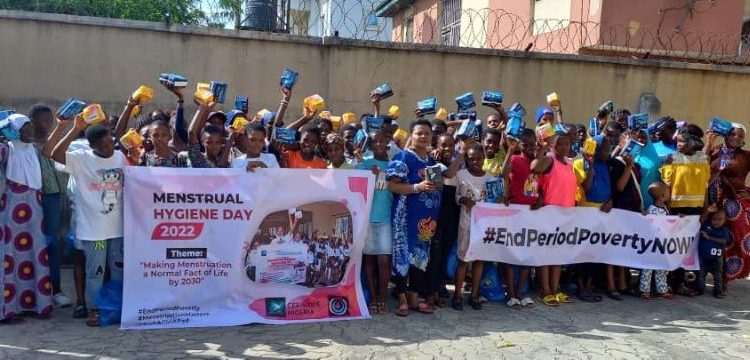A Non-Governmental Organization, the Centre for Children’s Health Education, Orientation and Protection (CEE-HOPE) recently marked the International Menstrual Hygiene Day with a call for government intervention in ending period poverty in Nigeria.
At a one-day seminar in Lagos which attracted several teenage girls from communities across Lagos and Ogun States and featured talks on rape awareness and career choices and others, CEE-HOPE’s Executive Director, Betty Abah lamented the impact of period poverty on women and girls.
“Millions of women and girls in Nigeria are going through very hard times managing their periods because they lack the finance to purchase menstrual hygiene products, especially at a time when basic eating is a big challenge for many.” She added that the annual event was one of the avenues to raise general awareness about period poverty, menstrual hygiene management, and associated challenges and to draw the government’s attention to intervene by providing free sanitary products to school girls so that they can stay back in school as well as the need for government to remove taxes on all sanitary products.
“Countries like Kenya and Uganda which are relatively poorer than Nigeria provide pads for school girls monthly while Rwanda has removed taxes on all sanitary products. Scotland on its own provides free sanitary products for females within the reproductive age brackets monthly. Nigeria in spite of the ravaging poverty has not considered any of these options, she noted.
Other speakers who spoke at the event whose theme was ‘Making menstruation a normal fact of life by 2030’ include Anker Amurawaiye, a teacher, entrepreneur, and youth coach, Anthonia Ojenagbon, a gender advocate, and Yinka Kenny, a TV host and founder of the Yinka Kenny Girls Foundation.
Mrs. Amurawaiye urged the girls to maintain the highest form of hygiene during their monthly period as it is a natural phenomenon and nothing to be ashamed about as period is not a taboo.
Corroborating her, Yinka Kenny, a child rights advocate, who spoke on the myths of menstruation charged the girls to see menstruation as a norm because it is natural to women and girls.
She also mentioned that the girls should desist from any attitude that could reinforce the myths and negative perceptions about menstruation.
On her part, Anthonia Ojenagbon, a Child rights advocate spoke about child sexual abuse, citing her personal experience and how she went through the ordeal but garnered the strength to overcome depression and suicidal thoughts which were the aftermath effects. She also encouraged the youngsters to report the slightest hint of abuse as perpetrators are encouraged to continue in their heinous crimes when they are not instantly exposed.
Other speakers who addressed the girls virtually (via video) on period poverty and menstrual hygiene management were Sanaa Mehajer of Girls on A Mission (GOAM), Australia, and Andrea Guadalupe Rodriguez of OPC NGO, Mexico.
The event also witnessed the launch of CEE-HOPE’s latest advocacy movie, “Leave to Live,” which focuses on domestic violence. It featured eminent Nollywood actors such as Segun Arinze, Ngozi Nwosu, and Papa Ajasco amongst others.
Participants at the event were girls from Makoko, Ori-Oke, Monkey Village, Ifelodun communities in Lagos, and Matogun in Ogun State.

